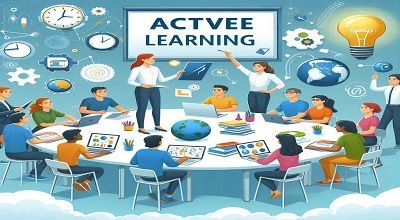Active Learning
Active learning is an instructional approach that encourages students to engage more actively in the learning process, rather than passively receiving information from a teacher or textbook. It involves students taking a more proactive role in their own education, which often leads to deeper understanding, improved retention of information, and the development of critical thinking skills. AL can take various forms and can be applied in both traditional classroom settings and online learning environments.
Here are some key characteristics and benefits of active learning:
- Student-Centered: Active learning shifts the focus from the teacher to the student. It recognizes that students have different learning styles, interests, and abilities and allows them to take ownership of their learning.
- Engagement: A-learning methods are designed to engage students actively in the learning process. This can include group discussions, hands-on activities, problem-solving exercises, debates, and more. When students are engaged, they are more likely to stay motivated and interested in the subject matter.
- Critical Thinking: A-learning encourages students to think critically and apply their knowledge to solve real-world problems. It promotes higher-order thinking skills such as analysis, synthesis, and evaluation.
- Retention: Research has shown that active learning methods can lead to better retention of information compared to passive learning. When students are actively involved in learning, they are more likely to remember and understand the material.
- Collaboration: Many active learning techniques involve group work or collaboration among students. This fosters teamwork and communication skills, which are valuable in both academic and professional settings.
More Benefits…
- Feedback: Active learning often includes opportunities for immediate feedback, either from peers or instructors. This helps students identify and address misconceptions or gaps in their understanding.
- Adaptability: A-learning can be adapted to various subjects and educational levels. It can also be customized to suit the needs of diverse learners.
- Motivation: A-learning can make the learning experience more enjoyable and motivating for students. It can make learning feel less like a passive chore and more like an active exploration.
- Preparation for the Real World: AL mirrors real-world problem-solving and critical thinking skills that students will need in their future careers and everyday life.
Final Words
Examples of active learning strategies include problem-based learning (PBL), case-based learning, flipped classrooms, think-pair-share, peer teaching, interactive simulations, and group projects.
In summary, A- A-learning is an educational approach that places students at the center of the learning process, engages them actively, and fosters critical thinking, collaboration, and better retention of knowledge. It has been shown to be effective in improving learning outcomes and preparing students for success in their academic and professional pursuits.
